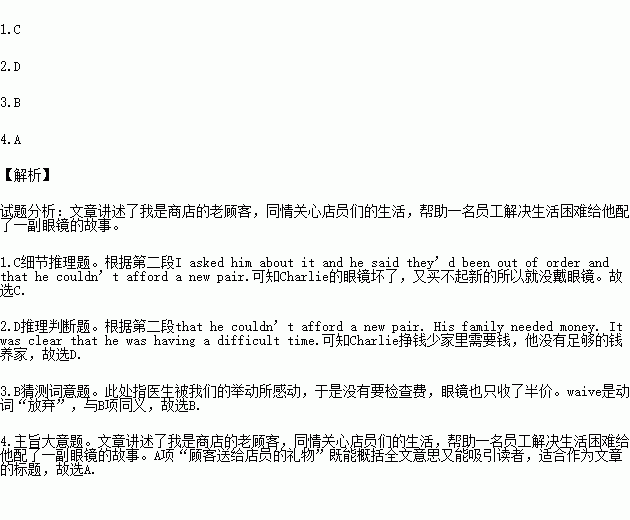题目内容
My wife and I have always been friendly with the clerks at the local store. I don’t think many people appreciate what a difficult job these clerks have. They work for a little money and I often wonder how they make ends meet.
One of the clerks, Charlie, was always wearing his glasses but he didn’t one day. I asked him about it and he said they’d been out of order and that he couldn’t afford a new pair. His family needed money. It was clear that he was having a difficult time.
We wanted to help him, so we turned to our own eye doctor for help with a plan. We had his secretary contact him, asking him to come in for an eye exam for free. We told the doctor to let him order whatever glasses he wanted and that we would pay for them. Although Charlie questioned what was going on, the doctor just told him that someone had offered the money for his new glasses. When we went in to pay the bill, the doctor told us he was touched by our idea so that he waived the exam fee and only charged us for half the price of the glasses!
It was so wonderful to see Charlie in his new glasses and he enjoyed telling all the regular customers how the gift came about. I’m sure that upon hearing his story, ideas of kindness may have come in the minds of many people.
1.Why didn’t the clerk Charlie wear glasses one day?
A. It was very warm and fine.
B. His glasses were missing.
C. His old glasses were broken.
D. He forgot to wear his glasses.
2.From the passage, we can infer that ______.
A. Charlie was a young man with skills
B. Charlie knew who paid the money for the new glasses
C. Charlie completely accepted the money for the new glasses
D. Charlie couldn’t support his family with enough money
3.The underlined word “waived” in the third paragraph can be replaced by ______. waive
A. took up B. gave up
C. cut down D. put off
4.Which of the following could be the best title for the passage?
A. Customers’ Gift to an Employee
B. A Friendly Clerk — Charlie
C. The Wonderful Feeling of Helping others
D. An Expensive Pair of Glasses
 名校课堂系列答案
名校课堂系列答案
